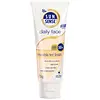What's inside
What's inside
 Key Ingredients
Key Ingredients

 Benefits
Benefits

No benefits
 Concerns
Concerns

 Ingredients Side-by-side
Ingredients Side-by-side

Bis-Ethylhexyloxyphenol Methoxyphenyl Triazine
Skin ConditioningDiethylamino Hydroxybenzoyl Hexyl Benzoate
UV FilterEthylhexyl Triazone
UV AbsorberEthylhexyl Methoxycinnamate
UV AbsorberTitanium Dioxide
Cosmetic Colorant1,2-Hexanediol
Skin ConditioningC12-15 Alkyl Benzoate
AntimicrobialMagnesium Aluminum Silicate
AbsorbentAmmonium Acryloyldimethyltaurate/Vp Copolymer
Betaine
HumectantCetyl Alcohol
EmollientSilica
AbrasiveDicaprylyl Carbonate
EmollientDiethylhexyl 2,6-Naphthalate
EmollientDimethicone
EmollientDisodium EDTA
Glycerin
HumectantCI 77491
Cosmetic ColorantCI 77492
Cosmetic ColorantIsopropyl Myristate
EmollientIsostearic Acid
CleansingMethyl Dihydroxybenzoate
Tocopherol
AntioxidantMyristyl Alcohol
EmollientNeopentyl Glycol Diheptanoate
EmollientNiacinamide
SmoothingPotassium Cetyl Phosphate
EmulsifyingPvp
Emulsion StabilisingPropylparaben
PreservativeTalc
AbrasiveWater
Skin ConditioningXanthan Gum
EmulsifyingBis-Ethylhexyloxyphenol Methoxyphenyl Triazine, Diethylamino Hydroxybenzoyl Hexyl Benzoate, Ethylhexyl Triazone, Ethylhexyl Methoxycinnamate, Titanium Dioxide, 1,2-Hexanediol, C12-15 Alkyl Benzoate, Magnesium Aluminum Silicate, Ammonium Acryloyldimethyltaurate/Vp Copolymer, Betaine, Cetyl Alcohol, Silica, Dicaprylyl Carbonate, Diethylhexyl 2,6-Naphthalate, Dimethicone, Disodium EDTA, Glycerin, CI 77491, CI 77492, Isopropyl Myristate, Isostearic Acid, Methyl Dihydroxybenzoate, Tocopherol, Myristyl Alcohol, Neopentyl Glycol Diheptanoate, Niacinamide, Potassium Cetyl Phosphate, Pvp, Propylparaben, Talc, Water, Xanthan Gum
Ingredients Explained
These ingredients are found in both products.
Ingredients higher up in an ingredient list are typically present in a larger amount.
Diethylamino Hydroxybenzoyl Hexyl Benzoate (DHHB) is a chemical UV-A absorber. It is formulated for high UVA protection (320-400 nm).
DHHB is well-liked for:
DHHB has been approved by the EU, Japan, Taiwan, and South America for use up to 10%. Unfortunately, it has not been approved for use in the US or Canada due to slow regulatory processes.
This ingredient is soluble in oils, fats, and lipids.
Learn more about Diethylamino Hydroxybenzoyl Hexyl BenzoateTitanium dioxide is a mineral UV filter widely used in sunscreens and cosmetics.
It is one of only two UV filters officially classified as “mineral” by regulatory agencies, the other being zinc oxide.
Titanium dioxide provides broad-spectrum protection mostly in the UVB and UVAII range, with some protection in the UVAI range.
While its UVA protection isn’t as strong as zinc oxide’s, the difference is minor.
A common myth is that mineral UV filters reflect UV light. However, modern research shows titanium dioxide absorbs UV radiation like chemical filters (~95% absorption & 5% reflection).
Thanks to its non-irritating nature, titanium dioxide is suitable for sensitive, acne-prone, or redness-prone skin. It is unlikely to cause "eye sting" like other sunscreen ingredients.
A major drawback of this ingredient is its white cast and thick texture. This is why mineral sunscreens often leave a white cast and are less cosmetically elegant than chemical/hybrid sunscreens.
To improve white cast and spreadability, micronized or nano-sized titanium dioxide is often used.
There are ongoing concerns surrounding nano-titanium oxide's impact on marine ecosystems.
There is no conclusive evidence that any form of titanium oxide (or any other sunscreen ingredients) will cause harm to marine ecosystems or coral reefs. The science is still developing but many consumers are keeping a close eye on this issue.
Please note, many destinations have reef-safety sunscreen rules. For instance, the U.S. Virgin Islands advises all visitors to use non-nano mineral sunscreens.
Nano mineral sunscreens once raised safety concerns about absorption into skin.
Extensive research has shown that they do not penetrate healthy or damaged skin; they remain safely on the surface and the top layer of dead skin (stratum corneum).
You'll likely find titanium dioxide bundled with alumina, silica, or dimethicone. These ingredients help make titanium dioxide highly photostable; this prevents it from interacting with other formula components under UV light.
Learn more about Titanium Dioxide